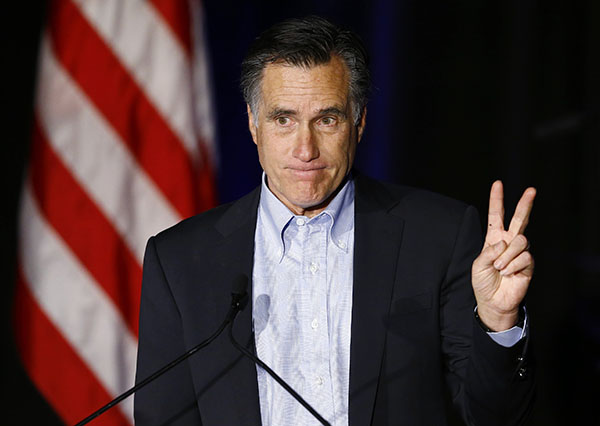Democratic effort to define Jeb Bush starts with Mitt Romney
Updated: 2015-02-09 14:34
(Agencies)
|
||||||||
|
Former Florida Governor Jeb Bush addresses the Detroit Economic Club about his "Reform Conservative Agenda" in Detroit, Michigan, February 4, 2015. [Photo/Agencies] |
WASHINGTON - Democrats, despite many months until the first votes are cast in the 2016 presidential race, are already drawing comparisons between former Florida Gov. Jeb Bush and the Republican Party's 2012 White House nominee Mitt Romney - and they don't consider them flattering.
Mitt Romney opposed the government's rescue of US automakers as did Bush. Both worked in finance and backed the Wall Street bailout. Both are advocates of tax cuts that Democrats contend only benefit the wealthy and big business.
Democrats are unwilling to let Bush define himself as a reformer who aims to close the gap between the rich and poor, so they are trying to paint him as this campaign's Romney. The ex-Massachusetts governor struggled in 2012 against criticism related to his work in private equity and his portrayal by President Barack Obama's allies as a cold-hearted plutocrat.
"We don't need to try to show that Jeb is like Romney. He pretty much is Romney," said Eddie Vale, vice president of American Bridge 21st Century, a liberal group set up to conduct opposition research on Republicans. "When it comes to any ideas or policies, he's the same as Romney."
Romney's decision to not run in 2016 could be a boost for Bush and New Jersey Gov. Chris Christie, who were competing for the support of the Republican Party's establishment-minded voters and donors. Romney's exit comes after several of his former major donors and a veteran staffer defected to support Bush, the brother and son of former presidents.
 |
|
Former Republican presidential candidate Mitt Romney gestures as he speaks at the Republican National Committee Winter Meeting in San Diego, California in this January 16, 2015 file photo. Republican Mitt Romney said on January 30, 2015 he will not seek to run for president in 2016. [Photo/Agencies] |
This past week in his first major policy speech as a potential presidential candidate, Bush emphasized to the Detroit Economic Club an upbeat economic message and touched on overhauling the nation's immigration system and trying to improve the lives of children underserved by public schools.
Democrats countered by circulating the transcript of a 2012 interview in which Bush cited his opposition to the auto bailout. In the interview, Bush said the auto rescue, a key issue in Michigan, was "driven by politics" and he noted the Obama administration's role in shuttering car dealerships and providing the United Auto Workers union with an equity stake in Chrysler.
Obama's team successfully used that bailout as a wedge against Romney in Michigan and Ohio, repeatedly referring to a 2008 Romney op-ed with the headline, "Let Detroit Go Bankrupt." Although Romney did not write the headline and advocated a managed bankruptcy for the industry, it created the impression that he was willing to forgo thousands of US auto jobs.
Bush's early approach to his potential campaign signals a desire to avoid such pitfalls, as well as Romney's most notable gaffe - his behind-closed-door dismissal of the "47 percent" of Americans who, he said, don't pay income taxes.
During a question-and-answer session after the Detroit speech, Bush said losing his first bid for Florida governor in 1994 taught him that winning campaigns requires building an emotional attachment with voters. When he won the job four years later, he said, he campaigned in places _ from black churches to public schools in poor communities - where few expected a Republican to go for votes.
That, Bush said, allowed him to "to connect on a human level with people, and offer ideas that are important to people, so that when they think of me they think I'm on their side and that I care about them. ... You've got to care for people before you get their vote.
"That experience on a national scale has got to be part of a strategy," he said.
Democrats say that's a hollow argument and they point to Bush's record as governor, which included the eventual elimination of the state's tax on financial assets. Democrats argue that primarily helped the wealthy.
They also are eager to note how Bush, after leaving office, served on an advisory board for Lehman Brothers, a financial firm that collapsed in 2008 during the recession. They compare Bush's work in private equity to Romney's role at Bain Capital, which was criticized during the 2012 campaign for its leveraged buyouts of companies that in some cases led to job losses.

 Sam Smith triumphs with four Grammy wins
Sam Smith triumphs with four Grammy wins
 Top 10 ways to spend your year-end bonuses
Top 10 ways to spend your year-end bonuses
 Paintings by DPRK's Mansudae Art Studio debut in Shenyang
Paintings by DPRK's Mansudae Art Studio debut in Shenyang
 2015 Xi'an Lunar New Year Lantern Shows kick off
2015 Xi'an Lunar New Year Lantern Shows kick off
 More than 60 int'l students participate in charity bazaar in Hangzhou
More than 60 int'l students participate in charity bazaar in Hangzhou
 Crouching Tiger actress says yes to proposal: media
Crouching Tiger actress says yes to proposal: media
 Frozen Hukou Waterfall
Frozen Hukou Waterfall
 It's bikini time in winter
It's bikini time in winter
Most Viewed
Editor's Picks

|

|

|

|

|

|
Today's Top News
Xi plans to make state visit to US
Trade numbers take big hit in January
US pledges to develop constructive relationship with China
Venezuela's economic woes to continue: Panel
Democratic effort to define Jeb Bush starts with Mitt Romney
China seeks compensation from Mexico after high-speed project suspended
China to build two nuclear power plants in Argentina
Search continues for 3 missing in TransAsia crash
US Weekly

|

|







